Human Rights Violations in Development Project in Uganda
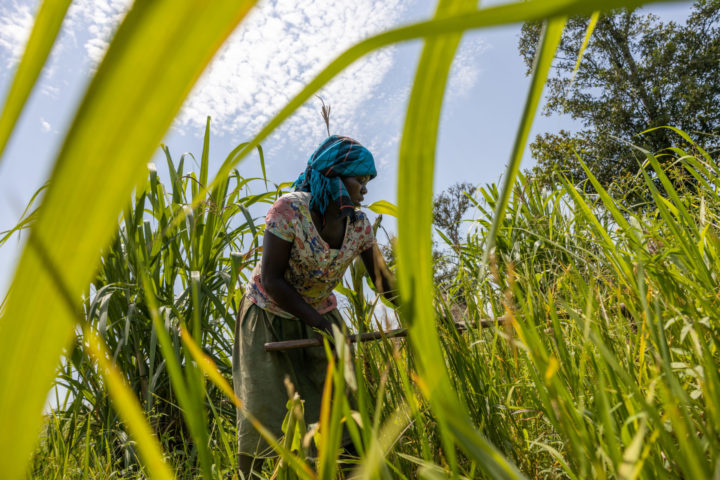
An irrigation project to help fight poverty in Uganda has led to conflicts between the authorities and the locals. The project, which is supported by the African Development Bank and the Nordic Development Fund, seeks to expel the local population from their lands in Pakwach district. Many people have been shot and injured by the country’s military for their protests against the project.
August 11, 2021, Paten South, Pakwach District: Silvia Anican (29) and three other women are on their way to fetch water. They take the usual road across the rice field to get to the borehole on the other side. Some distance ahead they see a dozen uniformed men. Some have green military clothes, others are from the police.
– Stop there! Do not walk another meter! shouts one of the men. In the next moment, the women are ordered to sit down on the ground. Minutes later, they are told to get up again.
– Dance for us now! Sing a song ! says a man from the defence.
Silvia and the women start performing for the men. Some laugh out loud, while some are angry and throw ugly words at the women. When the dance is over, they are taken to a place where dirty rainwater fills a large hole in the road.
– Take off your clothes now, you are going to swim! say the men. The women are dragged down and rolled around in the dirty water while their bodies are beaten with wooden sticks. When the women try to ask what is going, the men answer that this is what happens to people who refuse to give up their land.
Violent land grabbing
Exactly 24 hours ago, several of the women’s friends were wounded by gunshots and tear gas from the military and police in the area. The background to the incident is an ongoing conflict between the authorities in the Pakwach district and the Paten clan, to which the women belong.
The construction company Coil Company Limited is behind an irrigation project that will contribute to increased food security and poverty reduction among farmers in Uganda. Disagreements with the Paten clan began when the authorities sought to expand the land for the project, which originally started in the Nebbi district of northern Uganda. According to members of the Paten clan, who have lived in the area for generations, the authorities demanded an area of 365 acres – something they were allowed to use for the project. Later, the authorities stated that it was a question of 365 hectares, which is more than twice as large an area. The locals have not accepted this.
– We cannot just give up land that our families have lived on for generations without a formal agreement on compensation. They think they can just come here and start digging up our fields. When we refuse, they take up arms, says Denis Ovonji, who belongs to the Paten clan and is a local activist in the area.
The project, which has a price tag of around 91 million dollars is financed by the African Development Bank (AfDB) with support from the Nordic Development Fund (NDF). AfDB has contributed around 76 million, and about 6 million comes from NDF. The remaining amount is from the Ugandan government. The five-year project (2016-2021), which was supposed to be completed in September, has been delayed due to the conflict.
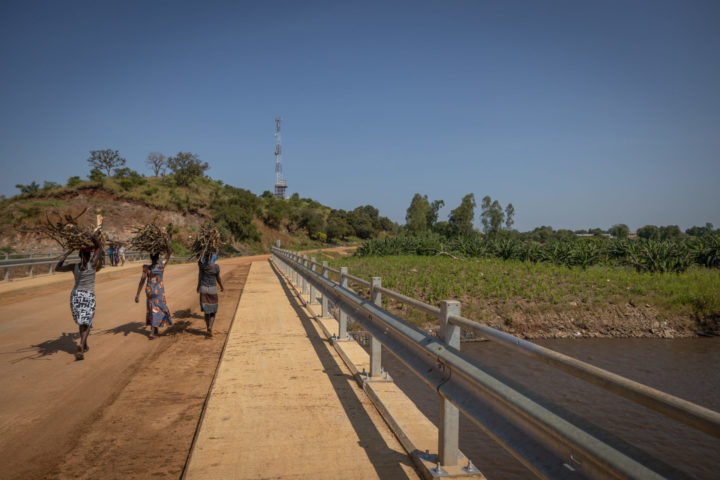
Women carry firewood from one side of the river in Pakwach to the other. The river, which flows from the Democratic Republic of Congo, runs straight through the disputed area where the Paten clan lives. The conflicts, which flared up earlier this year, have made the inhabitants of the clan afraid to move freely in the area.
Violence against pregnant women
On August 10, representatives from the construction company, together with district leaders from the authorities, the police and officers from the defence, came together in a troop to begin the excavation work in the area. Members of the Paten clan came to the scene to find out what was going on and were attacked with tear gas and gunfire.
– They started digging up my rice field and I tried to ask why. Three men from the defense came towards me. One of them attacked me with tear gas and I fell straight to the ground on my stomach. I was six months pregnant, says Brenda Giramia (18).
She is sitting on the ground outside her home in the village of Paten north when we visit her. It has been almost three months since the incident and Brenda has severe pain in her stomach.
– I will soon give birth and have had pain in my stomach since the incident. When I came to the clinic I was denied help and I do not have the money to seek private care. I’m afraid something’s wrong with my child, she says.
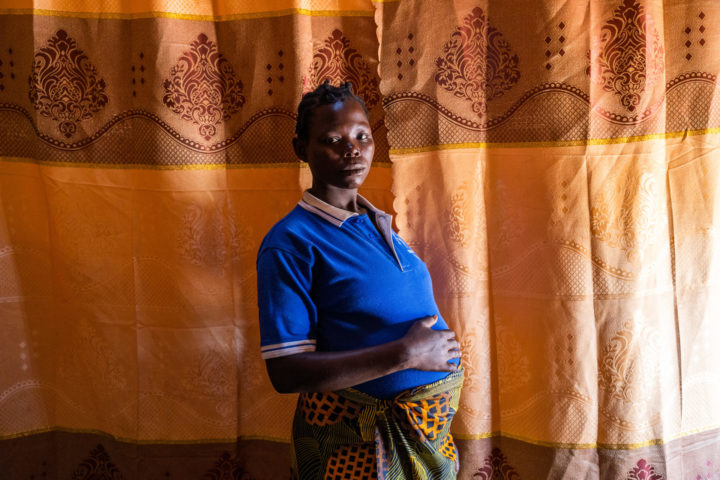
Brenda Giramia (18) was six months pregnant when she was attacked with tear gas in the area where she lives when she had come to ask why they tried to take the land from her. The tear gas made her fall and she landed up on her stomach.
Gunshot wounds
Of the Paten clan’s around 1000 members, we find many single mothers who depend on the fields to survive. Janet Akumu (40) is one of them. She has seven children whom she supports by growing rice and the local grain called sorghum. She got severely hurt when the military attacked her and injured her leg with rubber bullets.
– They have destroyed parts of my field and I no longer dare to go there. Now it is my son who helps me, but it is very risky to visit the area, says Akumu.
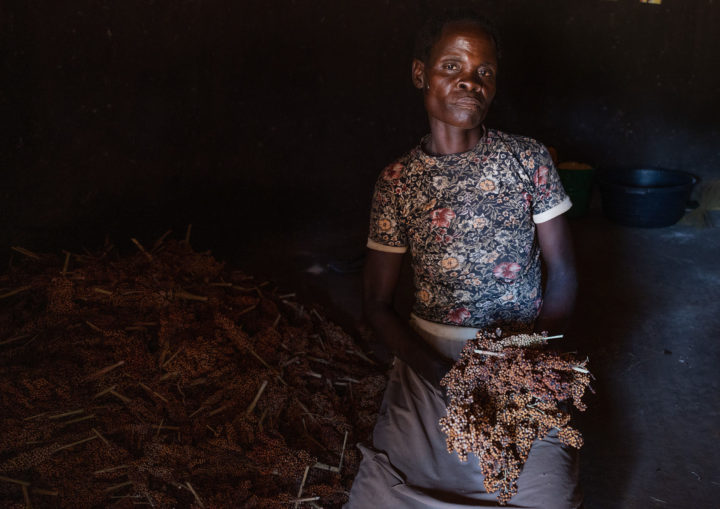
The mother of seven, Janet Akumu (40) is sitting with sorghum (grain) from her field. She and her family have been producing rice, sorghum and more for several generations in the area. She was among many who got injuries when the military attacked the community earlier this year. She has wounds on her legs from rubber bullets.
Some distance from her house, another woman is suffering from pain after being shot and beaten. The mother of five, Nyivuru Grace (42), lifts up her skirt and shows her legs that are full of wounds from rubber bullets. She was in her rice field that day when the authorities and military came to clear land for the irrigation canal.
– I am a single mother and the land I have is my only livelihood. Now I am terrified to return to the field. What if they come back to hurt us again ?, says Grace.
The injuries to her legs she received when she tried to ask what was going on. She was brought to the government clinic in Pakwach, but was denied help by the health personnel.
– I was told by a nurse that the authorities had instructed them not to help anyone who lives in the disputed area. I had to return home again and still have severe pain in my leg. It feels like there are remnants of something inside there, says Grace.
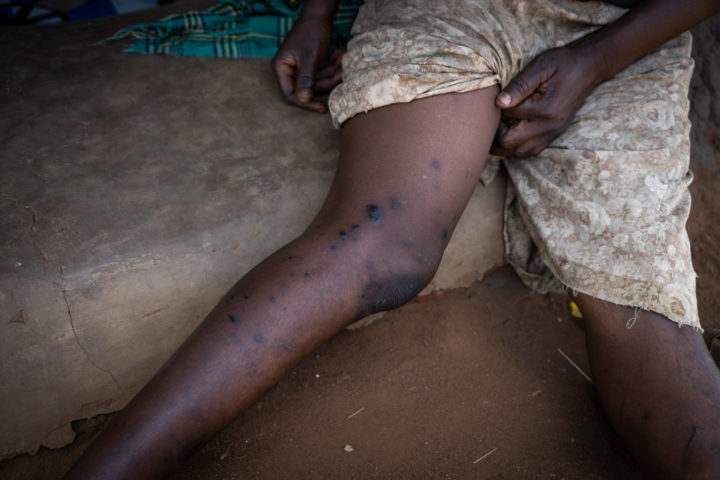
The mother of five Nyivuru Grace (42) is showing her legs which are full of gunshot wounds.
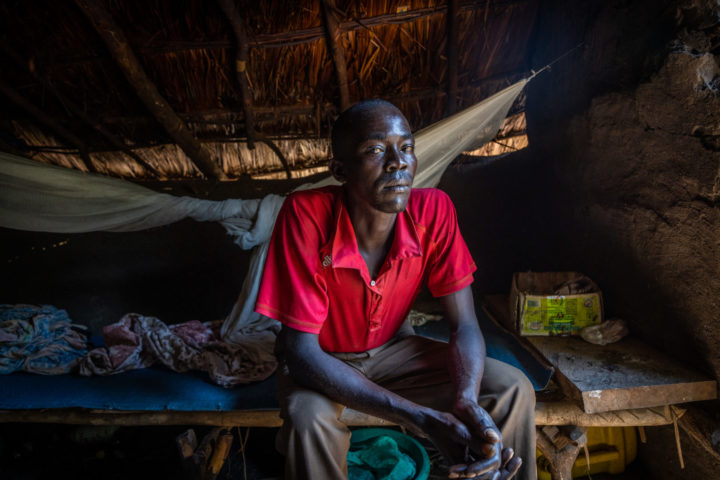
Richard Ongom (31) lives in the village of Paten Lower. He is the father of five children and lived here for many years. The family has 4 acres of land where they grow rice, bananas, papaya etc which they sell at the local market. Richard was present when the military attacked the villagers in August. He shows marks on his legs and hands from hard punches with a weapon.
– There were three soldiers who came towards me and started beating. I had no choice but to run. Now I live with fear of being abused again and of losing the land we have. If they take the land, I have nothing to live for, says Ongom.
Expelled from work
The majority of the people we talk to from the Paten clan say that they have been denied help by both health personnel and the police.
– It is the leaders of the Pakwach district who have ordered the health center and the police to refuse help to members of the Paten clan. Few people here can afford private health care and many are still struggling with injuries after the brutal incidents. No one has had the incidents documented by the police, Ovonji says.
He and his family own a large area where they grow rice, among other things. Since the incident, fears of more conflicts have made it impossible for them to use the area as before.
– They say that this project is made to make our lives better and increase production in the fields, which is basically positive. The problem is that they (the authorities ed.amn) have not involved us in the process. If this project is here to bring something good, why do they use force and weapons ?, he says.
Ovonji worked as a primary school teacher before the project began and has lost his job after being accused of trying to stop the project. In a letter from the authorities in Pakwach from 16 August 2021, which KIOS has been given access to, Ovonji is accused of having been behind the Paten clan’s protests against the project. In the same letter, he is told to quit his job.
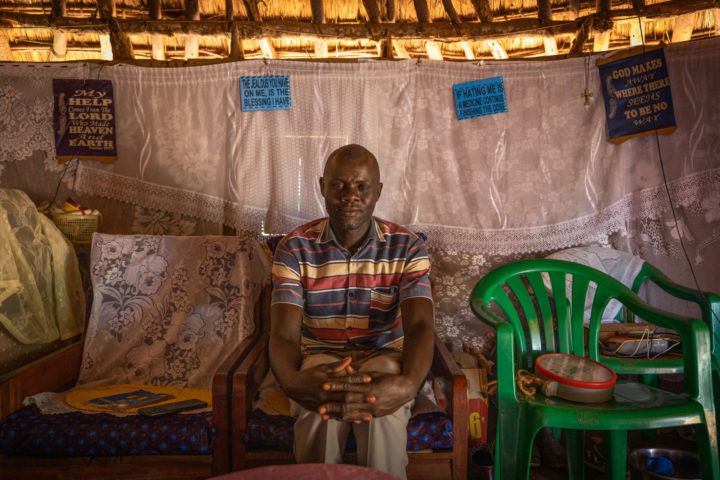
Denis Ovonji, who belongs to the Paten clan and is a local activist in the Ovonji area, has been at the fore-front in the fight for the land. He has been arrested several times and lost his job as a teacher.
– We have no problems cooperating with the authorities as long as they compensate us in the right way. We can not just give up the land that has been our livelihood for generations, says Ovanji.
Positive to development
The authorities have been in several talks with the clan chief since the beginning of 2019, but the meetings have not yielded any fruitful results.
– I am basically positive about the project and the state has the right to develop the area. What provokes me is the way it is done. I gave a clear message that I must discuss the matter with the inhabitants here, but they did not have time to wait and came back with weapons, says clan chief Santonio Onen Daudi (75).
He is wheeled out into the courtyard when KIOS visits his home in the village of Adiri. Daudi inherited the role of clan chief from his father and is today the head of the Paten clan’s ten villages. He is the one who has the last word in all decisions that are made within the clan’s areas.
The father of 22, who had to amputate his legs due to diabetes, is worried about the future.
– No money in the world is worth as much as our lands. In return for a possible takeover of our area, we want new, equally large land areas, with the same topography, says Daudi.
According to the clan chief, there has been a military presence in the villages in recent months.
– The military has established a base close to my home and they monitor everything I do. I am no longer allowed to hold meetings with members of the clan, he says.
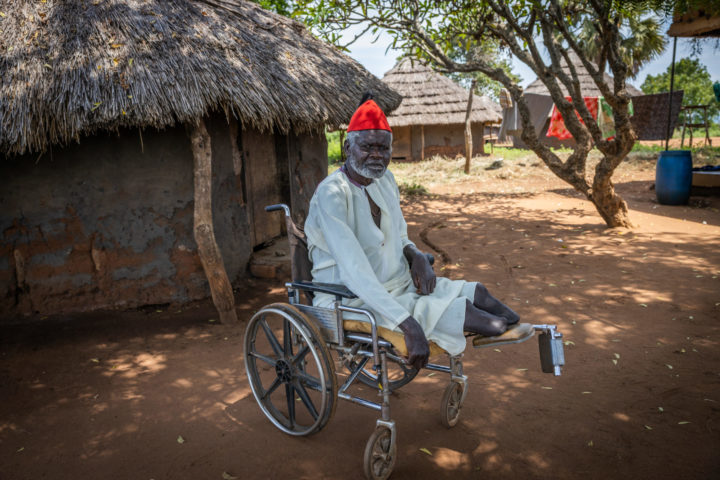
Santonio Onen Daudi (75), head of the Paten clan, is concerned about the future. The authorities have visit-ed him a number of times to ask for the clan. So far they have not come up with a solution and according to the clan chief there have been no discussions regarding compensation for the areas.
– I have given a clear message to the authorities that they can not just come here and take our land. The violent incidents in July and August has made us take the matter to court, says the clan chief.
No freedom for human rights activists
Several human rights activists and organizations have been stopped from working in the area and according to a number of local activists, journalists are denied access to the area.
Buliisa Initiative for Rural Development Organization (BIRUDO) is an organization that is affected. The local organization works in several places in Uganda with villages affected by development projects. They conduct information work to strengthen local knowledge about human rights, laws and procedures so that the population can stand up for their rights. BIRUDO has worked with the Paten clan for a number of years and has, among other things, helped them with lawyers to take the case to court.
– We have had several meetings with local authorities about the ongoing conflicts and the many attacks they are behind. At the meeting in early June, they made it clear that we are no longer allowed to work in the area, says Paolyel Onencan, general manager of BIRUDO.
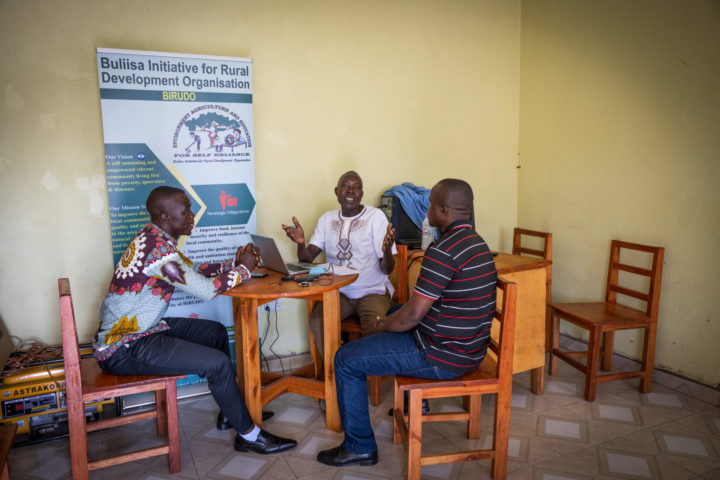
Buliisa Initiative for Rural Development Organization (BIRUDO) is a local organization funded by KIOS. The team has done extensive work in the area to provide the locals with knowledge about laws when it comes to land and human rights. In June they got a message that their activities have been temporarely suspended and they are not allowed to work in the community anymore.
Demanding action
The organization is one of a total of 28 member organizations of the Coalition for Human Rights in Development, which is behind a joint letter to the African Development Bank and the Nordic Development Fund. The undersigned demand immediate action for the attacks on the Paten clan. Just over a week after the letter was sent, the development bank responded: «We have previously been informed of the allegations in their letter and have sent a request to the authorities to carry out a detailed investigation. We expect to receive the findings from this study in a short time ».
According to several sources, the Nordic Development Fund has on several occasions relinquished responsibility, since they are not the main sponsor of the project. In an email interview with KIOS in November, they claimed that the matter is serious.
«NDF is strongly against reprisals and the use of force against people affected by projects, and asks that the complaint be treated in a constructive and respectful way…. Despite the fact that NDF’s funding focuses on other activities, we take the matter very seriously. Investigations are conducted, and complaint mechanisms are made available to potentially affected people and local communities by AfDB. NDF is following the situation closely and is waiting for the results of these processes», says Jesper Andersen, director of the Department of quality assurance and reporting, NDF.
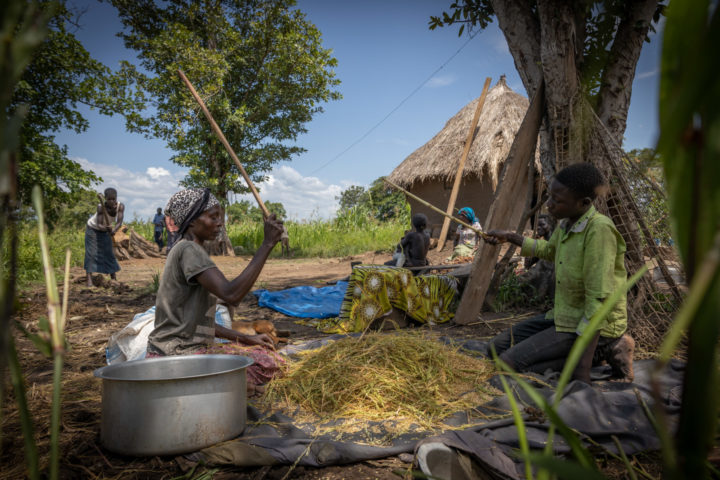
Rice is the livelihood of most farmers in the area. The rice they grow is sold to private people and cooperatives in the local market. The ongoing land conflict between the authorities in Pakwach and the locals has made many fear going to their fields. The result has been that many are forced to take up daily wage jobs elsewhere.
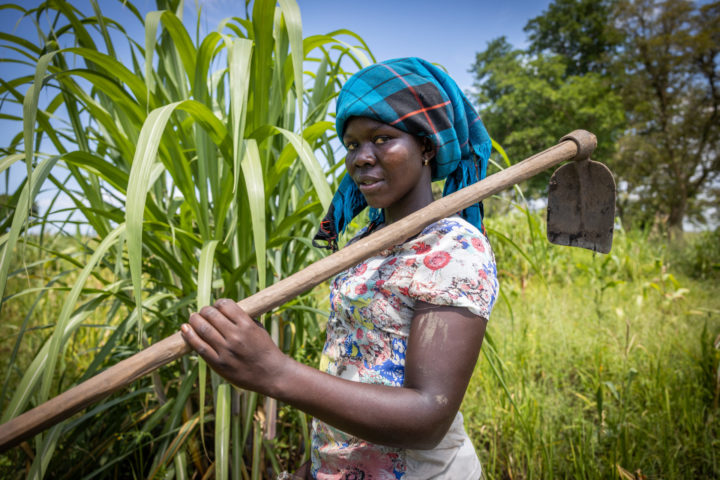
Silvia Anican (29) in the field outside the house where she lives. She has 12 family members and the family has lived in the area for generations. They grow rice, sorghum, cassava, corn and more to survive. The single mother is one of many who have been attacked by the country’s military and police. On August 11, she and three other women were attacked by security personnel in the area. Her family has been threatened by the authorities for refusing to give up their lands.
November 6, 2021, Paten South: Mother of four, Silvia Anican (29), lives in the middle of the disputed area of the Paten clan. The house is located on a large field where the main produce is rice that has provided for the family for many years. Silvia is traumatized after the incident in August when she and the three friends were attacked by the defense. She fears for the family’s future.
– The project is basically positive but the violent strategy they use is wrong. When the district leaders were here, we were told that we would have to use the land according to their wishes and methods. If we do not manage to produce enough, we will lose our land for good, says Silvia.
Text and photos: Sofi Lundin
The journalist has been in contact with a number of leaders from the local government in Pakwach district. None of them wanted to answer our questions. The construction company Coil Company Limited has also not responded to inquiries.
What have the Nordic Development Fund (NDF) and the African Development Bank (AfDB) done?
KIOS has in advance received a comment from NDF to this article:
“As partners to AfDB in the overall Farm Income Enhancement and Forest Conservation Project 2 (FIEFOC 2) we understand our responsibility in providing the support we can to have this matter properly investigated and resolved. NDF is strongly against reprisals and the use of force towards project affected people and calls for grievances to be addressed in a constructive and respectful manner.”
NDF has not been willing to meet with KIOS or representatives of local organizations. It has been following up with AfDB to find out if formal complaints had been filed and what investigations have been, or are being carried out. NDF is pleased a formal complaint has now been filed with AfDB’s Independent Review Mechanism (IRM) and are waiting for the outcome of this process.
According to information KIOS has received, AfDB gave their response to the IRM’s request without visiting the field and without hearing community members. The IRM is continuing to investigate the case. Local organizations are trying to get IRM to at least visit the area.
KIOS has also been in touch with the Ministry for Foreign Affairs of Finland, which says it takes any allegations of wrongdoings seriously and proactively follows up on them with the involved organizations where Finland is a member, shareholder or donor. The Ministry has been in contact with AfDB and urged the Bank to appropriately investigate the allegations.
